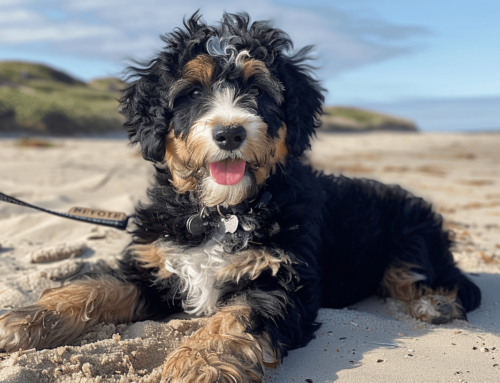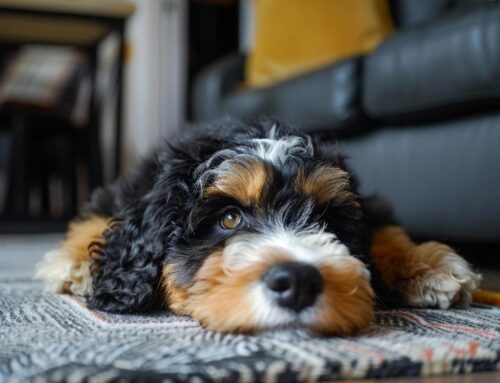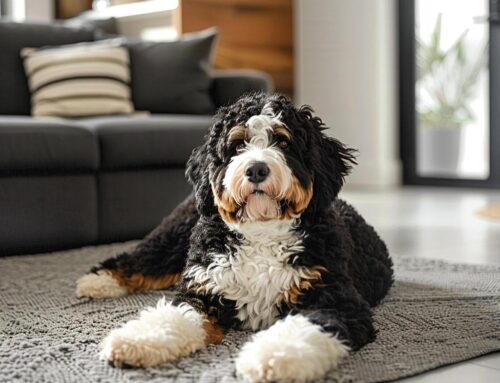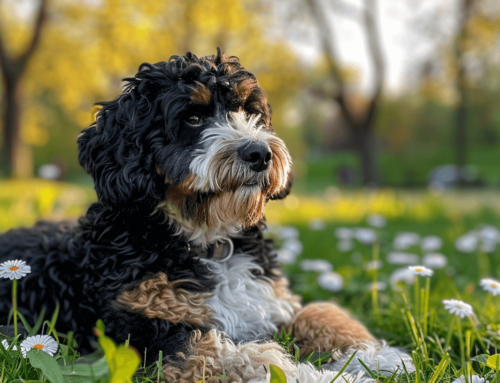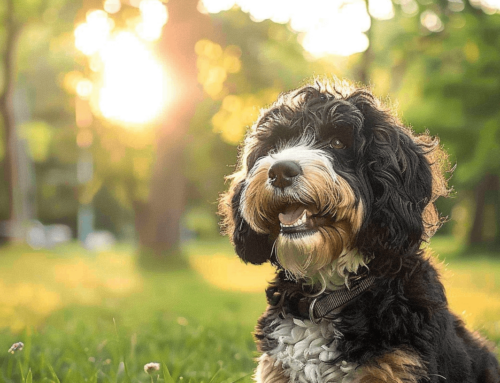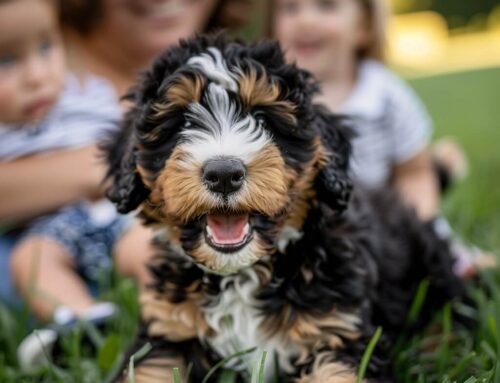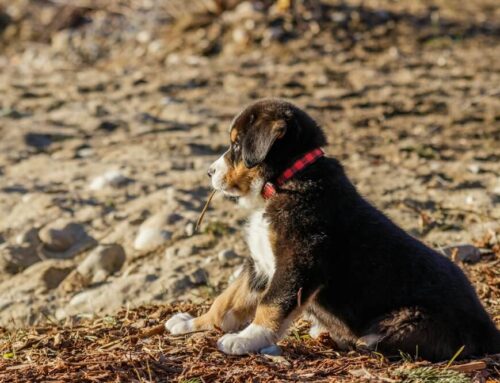It’s normal when puppies use their teeth to express their emotions, discover boundaries and explore the world around them. This helps them understand their surroundings and socialize with other dogs. It’s especially true for teething puppies, who need appropriate chew toys to help them learn how to engage in “puppy mouthing” without hurting their furry or human friends.
It can be frustrating when a puppy starts biting, but there are ways to help. Here are seven simple ways to teach your puppy biting behavior isn’t appropriate.
Table of Contents
Why Do Puppies Bite?
In nature, puppies grow up with a litter of other dogs and interact with puppy behavior, including play biting. Through this group practice, puppies learn bite inhibition that keeps them from offending other puppies in social situations or the humans they interact with.
When you’re raising a new puppy at home, without access to a litter of other puppies that can help socialize your pet using appropriate play behavior, you’ll need to teach your puppy yourself or with the help of an experienced dog trainer. Here are seven easy steps to training your puppy’s behavior, stopping your puppy from nipping and biting you, other dogs and family members.
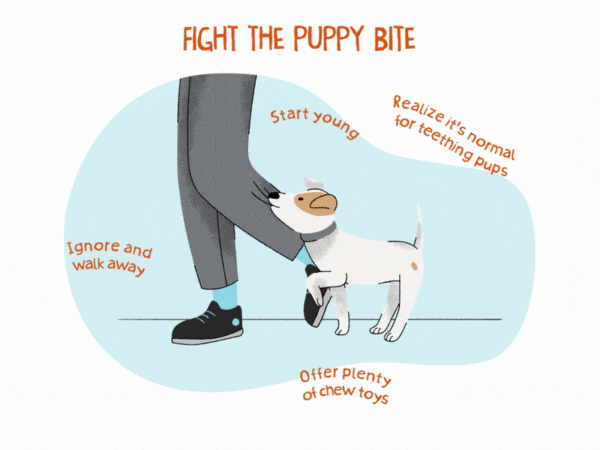
1. Provide Adequate Exercise
Ensuring your dog has consistency and a daily physical exercise routine is one of the best ways to stop puppy biting. Physical and mental exercise is crucial to healthy development for a few reasons.
First, your pup needs constant play and exercise to grow strong muscles and develop its instincts, such as learned puppy bite inhibition, in a safe and supervised way.
Secondly, the socialization that occurs when dogs play tug-of-war or wrestle can help your pup learn healthy boundaries with other puppies and people.
2. Engage in a Training Session
Sometimes, when you have a puppy nipping you, it’s because it wants attention. This is a great time to engage in an impromptu training session to stop your puppy from biting you in the future.
You can stop your dog from biting by distracting it with a favorite stuffed toy, then playing tug-of-war with it. Often, puppies just have a lot of energy they aren’t sure what to do with. They’ll gradually stop nipping if you immediately redirect them to a positive behavior like a play session.

3. Teach Commands Such as “Leave it” Using Toys and Treats
One way to instill a sense of self-control in your pup is to teach it commands that make it wait before playing with its favorite toy. One great way to train patience in your dog is by teaching it the “leave it” command. It goes something like this:
Place your puppy’s favorite toy or treat in front of it on the floor or hold it in your hand. When it runs to grab the object, stop it by grabbing its harness or collar and pulling it back while saying, “Wait.” After it stops trying to get to the treat or puppy toys for a few moments, say “Good dog” and let it get the prize.
Make it a game to see how patient your puppy can be. After doing this a few times, increase the amount of time your puppy needs to wait for the toy. Remember that you also need patience and give your pup lots of love and belly rubs after a job well done.
4. Provide Stimulating Chew Toys
Puppies have a natural urge to bite and chew as they grow older and begin to get their adult teeth. It can be painful, and chewing tends to relieve their misery, so ensure you keep plenty of teething toys on hand to comfort your dog and teach it bite inhibition.
When your puppy has issues such as separation anxiety, you can take note of its body language, including biting, to figure out how to soothe it. In this instance, it might be a good idea to give it a comforting chew toy when you leave it or put it in its crate. This way, any negative response to being left alone will be immediately calmed.
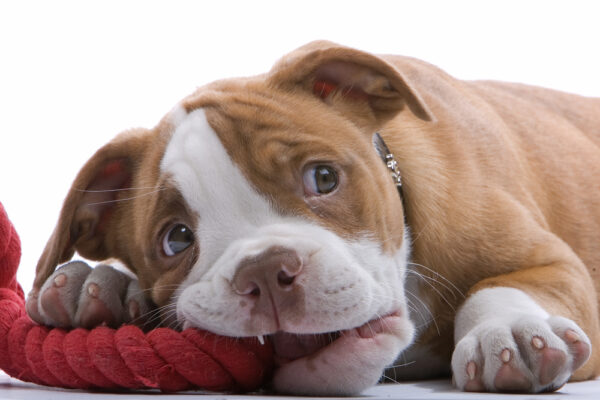
5. Don’t Get Frustrated If Your Puppy Bites
Getting angry only makes the situation worse. There’s no way you can avoid occasional frustration, but try not to let it influence your interaction with your dog. Stopping puppy biting can be tedious, but it grants many opportunities for you to bond and build trust with your new pup.
Your puppy’s biting can be solved with perseverance and patience.
If your puppy nips or bites you during play, be sure not to hold your puppy’s mouth shut or yell at it, as these methods are ineffective and send counterproductive signals. Causing a negative response from your dog during play can lead to more aggressive biting, so it’s recommended to stick to the ignore and redirect strategies.
6. Reward the Positive Moments
Carrying a bag of its favorite high-level reward treats when you’re out with your pup. This is a great way to discourage unwanted behavior, as your dog knows that well-behaved pups get those tasty treats.
Food motivation is one of the first ways dogs learn appropriate behavior, as their mother might push them off the teat to stop the puppy from biting. Use this food-based reward system to give your dog the incentive it needs.
While at home, use an interactive food bowl and treat-filled bully sticks that provide mental stimulation to teach your puppy a safe way to get their biting urges out, which are normal in a new puppy with sore gums and pain from growing out of their baby teeth.
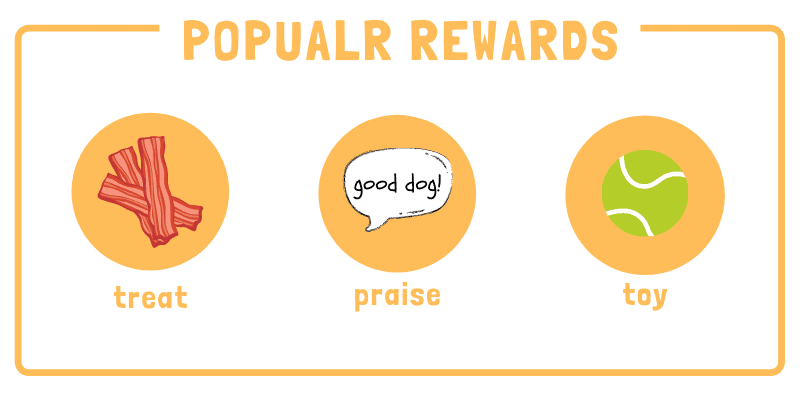
7. Give Small Timeouts When It Does Bite
When puppy biting persists, a timeout might mean putting your puppy in their kennel or sending them to the doghouse for a short period. It could be as simple as ignoring it when biting begins, setting up an immediate boundary to let it know its biting behavior won’t be tolerated. Use positive punishment or natural consequences to get the point across.
To teach your puppy or adult dog that biting is inappropriate, stop the behavior by ignoring it. Dogs use their teeth to get attention, whether in a playful way or as aggressive behavior. Stop the behavior in its tracks by showing your dog that you won’t engage, and ignore it for 30 to 60 seconds once it begins nipping and biting.
The goal is to get your dog to sit quietly for 10 to 15 seconds, not whining or begging but waiting for your attention. This way, you help your puppy learn self-control and respect for you.
If this method doesn’t work and your puppy simply escalates, you can try leaving the room for a minute or two. Make sure your room is puppy-proofed in case your little friend gets into mischief while you’re gone.
Your pet must understand that you’re the boss and must listen. Again, the goal is to get it to sit quietly or lay down and wait for you. If you use a crate, it might be appropriate to put it in a one-minute timeout if its behavior continues to escalate instead of improving.
Train Away the Biting Behavior
If you’d like to teach your new puppy biting etiquette in a safe but social environment, sign your pet up for puppy classes that help your puppy stop biting and provide a fun outlet for excess energy. Playing with other puppies is an excellent way for your dog to pick up on appropriate behaviors naturally.
Looking for a New Family Member?
Central Illinois Doodles has plenty of options if it’s time to add a new furry member to your family. If you’re wondering which breed of doodle would suit you best, we can tell you both Bernedoodles and Goldendoodles are highly intelligent and love to learn and help. Check out our available puppies today.
